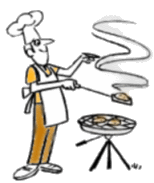|
The History of BBQ
Before we get into the history of BBQ, let me pose an important question. What do you visualize when you think of "BBQ?" You probably envision a guy like this one, flipping hamburgers, brats, hot dog or steaks over a hot flame. Don't get me wrong. I love to GRILL. I grill more than I BBQ. It's much more convenient. But..... This website is about BBQ. BBQ (or "Q" as I like to call it) is the beautiful, flavorful and sumptuous end result of an all-day social experience where the meat of your choice is slowly cooked (225 degrees Fahrenheit is best) over coals that have been rendered down from real wood logs. Hickory is my wood of choice. The meat becomes infused with a smooth and silky smokiness that is unmatched in any other method of cooking. The color of the meat becomes dark and rich. Just as beautiful as it is tasty. The exposure of the meat to the low temperature for an extended period of time (8 to 10 hours, sometimes longer) results in tenderness and juiciness that is unrivaled. Even the toughest and cheapest cuts of meat succumb to this magical method. Hell, my son's tennis shoes might be edible if BBQ'ed correctly. Good "Q" does not REQUIRE a sauce to be delicious. But, there is nothing wrong with having some quality sauces to add an extra "kick." "Q" is now BIG BUSINESS. Now that I have loosely defined BBQ, let's jump into the history of this unique American culinary tradition.
Let the History of BBQ Begin!When you drive through the "South" these days (Kentucky and below), it is amazing how many local BBQ joints you will see with smiling pigs as their logo. Why is that? Let's delve into the subject, shall we? The answer shall be revealed to you VERY soon! While there are a number of theories surrounding the true origins of BBQ, most experts believe the root of the word comes from the West Indies word "barbacoa," meaning to "slow-cook meat over hot coals." Notice how it doesn't say "indirect heat?" That's smoking in my opinion, but we'll cover that issue a bit later. The American version of "barbecue" can be traced to a time period prior to The Civil War. Let's cover that now.
Pre-Civil War and Civil WarThe pig was a staple of southern cuisine one-hundred years prior to The Civil War. In fact, plantation owners would release pigs into the woods to graze for months knowing that they could be easily hunted when food supplies were low. These pigs were semi-wild and a bit tough, but all parts of the pig were kept and consumed. Festivals and other gatherings were created around the slaughter and roasting of these semi-wild pigs. The traditional Southern BBQ grew out of these gatherings. Over time, the pig became a proud staple of southerners, and more care was taken to fatten and marble the pig. The southerners did not export pigs to the north, so these marbled swine became an exclusive food source to the south. Great festivals prospered. Church picnics, political rallies, plantation gatherings and more. BBQ was not a food of the upper class, nor was it something to be looked down upon. In fact, it was a unifier. It brought together all economic and social classes in one huge social gathering. And here is where I learned something. I thought I knew the origins of the term "pulled pork." You "pull the pork" apart when it is totally done and properly BBQ'ed...right? Wrong. Prior to the Civil War, the plantation owners would have these huge BBQ festivals. The slaves at the time would be given the cheap, tough cuts to prepare. Boston Butt, pork shoulder, etc. They learned to slow cook these cuts over coals. The slaves were typically so hungry that they would "pull the pork" off of the coals when the meat was done and could easily be pulled away from the roast.
The Origins of BBQ RestaurantsTake a drive into the former confederacy, and the highways are dotted with local BBQ restaurants. Most of these resturants can trace their roots back to original BBQ pits on the same property where men would sell their meat on the weekends to the local population. Enter the automobile and the expanding highwway system. This period of growth provided these BBQ'ers with the opportunity to sell their BBQ not just to the locals, but to travelers who were looking for a cheap, tasty and local meal. These pits quickly became viable restaurants that could turn a profit on a daily basis. Most of these local BBQ establishment have their own unique secrets, combinations of woods and cooking techniques, special side-dishes handed down from one generation to the next, as well as their own top secret sauces and rubs.
|
Join Dave on Facebook,
Twitter and YouTube
Just click on the logos below and sign up, friend, follow, etc. Secret BBQ and grilling tips to be exposed on a regular basis!
Google +1
If you like this recipe, share it with your friends and family. All you have to do is click on the "+1." Give it a try. It's fun!








